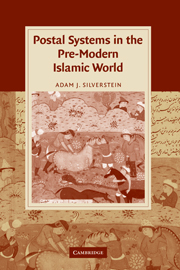Book contents
- Frontmatter
- Contents
- List of maps
- Acknowledgements
- List of abbreviations
- Introduction
- PART I THE PRE-ISLAMIC BACKGROUND
- PART II CONQUEST AND CENTRALISATION – THE ARABS
- PART III CONQUEST AND CENTRALISATION – THE MONGOLS
- 4 The Mongol Yām and its legacy
- 5 The Mamluk Barīd
- Conclusions
- Appendix: distances and speeds of the Barīd
- Bibliography
- Index
- Cambridge Studies in Islamic Civilization
5 - The Mamluk Barīd
Published online by Cambridge University Press: 18 July 2009
- Frontmatter
- Contents
- List of maps
- Acknowledgements
- List of abbreviations
- Introduction
- PART I THE PRE-ISLAMIC BACKGROUND
- PART II CONQUEST AND CENTRALISATION – THE ARABS
- PART III CONQUEST AND CENTRALISATION – THE MONGOLS
- 4 The Mongol Yām and its legacy
- 5 The Mamluk Barīd
- Conclusions
- Appendix: distances and speeds of the Barīd
- Bibliography
- Index
- Cambridge Studies in Islamic Civilization
Summary
Introduction
The postulate that the Mamluk Barīd is indebted to the Mongol Yām was pointed out by Sauvaget, and the hypothesis has been adopted and expanded by other scholars. The basic argument is that the early Mamluks were repeatedly exposed to Mongol military and administrative culture and adopted some of their military techniques, one of which was the postal system. In support of the argument, Gazagnadou has highlighted similarities between the Mongol and Mamluk systems, such as the existence of pāʾizas in the Mamluk Barīd, where they are referred to as alwāḥ al-barīd (‘Barīd tablets’). On the whole, the case is convincing, with three important caveats: first, there are significant aspects of the Mamluk Barīd that do not resemble the Yām and, moreover, are clearly distinct from Mongol practices. Second, in addition to their Mongol heritage, the Mamluks were heirs to a number of political and administrative traditions, some of which were at least as potent as the Mongol factor and most of which were of particular relevance to the administration of Egypt and Syria. Third, although Mamluk writers who treat the Barīd were aware of the Yām and had no qualms about crediting the Byzantines and Sasanids with influencing the caliphal Barīd, they do not ascribe the creation of the Barīd under Baybars I (r. 1260–77) to Mongol influences.
- Type
- Chapter
- Information
- Postal Systems in the Pre-Modern Islamic World , pp. 165 - 185Publisher: Cambridge University PressPrint publication year: 2007

